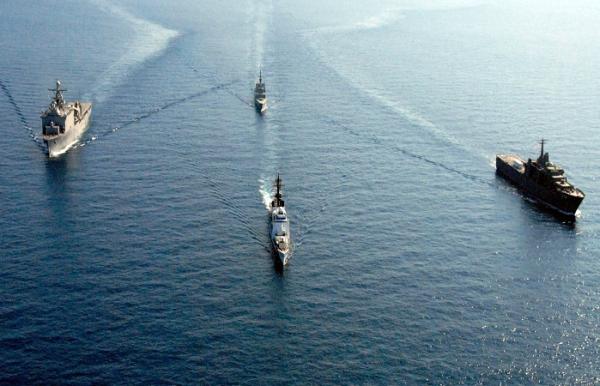
Bob Carr, Director, Australia-China Relations Institute, University of Technology Sydney |
This article appeared in the Australian Financial Review, November 11 2015.
Australia has every right to send patrols through international waters in line with our understanding of international law. In the wake of voyage of the USS Lassen on October 27, the US may expect it. Even expect that we do it bow to bow with American patrols.
There is one problem: we would be the only American ally or partner setting sail. A quick survey shows the others have ruled it out.
We would be elegantly casting ourselves as “America’s deputy sheriff”, to use the Howard-era shorthand.
Japan and India won’t be there. And their position confirms how fragile are the notions of a ‘trilateral’ or ‘quadrilateral’ linking those countries with the US and Australia. If these understandings can’t be invoked in respect of the South China Sea, this talk rings pretty insubstantial, sketched in the air with cigars by armchair strategists over port.
Take Japan. On October 30 its defence minister stated, “Tokyo had no plan to take part in US-led ‘freedom of navigation patrols’ in the South China Sea”. It’s not only the lack of military capacity; the Japanese public would not support it.
India, our theoretical partner in a quadrilateral aimed at containing China, has only called for peaceful resolution of the disputes. According to the Calcutta Telegraph on October 19, Prime Minister Modi was pointedly not available for a courtesy call on the visiting USS Theodore Roosevelt when the ship visited the Bay of Bengal. Presumably the US hoped the Indian Prime Minister would be briefed by its top brass.
Singapore, which might be considered an unofficial ally of the US, only talks about helping China and ASEAN reach a consensus on competing claims. Its apprehension at Chinese assertiveness can be assumed; but there’s no talk of any forward leaning.
One beguiling report from Canada suggests this US ally “does not want to support the US in Asia and risk hurting its Northwest Passage claim”. This is not just a Trudeau instinct; the Harper Government was intensely conscious of the advantages in its China relationship.
The United Kingdom now runs a China policy independent of Washington, quick to join the AIIB and aiming to become China’s “best partner in the West”, in the words of Chancellor George Osborne.
New Zealand, as confirmed in an Australia-China Relations Institute study in July, runs an entirely pragmatic China policy that has never depended on sign-off from Washington or Canberra. It chooses diplomacy to make its points and aims at enriching its farmers by loading their produce onto the shelves of Chinese supermarkets.
On October 28 The Diplomat reported that “South Korea’s unwillingness to come out more forcefully against Chinese assertiveness has persistently disappointed US alliance managers”. Last week the country’s defence minister made “guarded” remarks about the issue during US Defense Minister Ash Carter’s visit to Seoul.
The more appropriate response for Australia to Chinese dredging and airfield construction is to engage diplomatically with the Chinese, insisting they adhere to the promise of President Xi, made on September 25 during his state visit to the US, to avoid militarisation. And to clarify China’s claims in the context of international law.
As I’ve argued before, our influence with Beijing on this should be greater than normal precisely because the prospect of Australian patrols has been floated.
Meanwhile if 100,000 vessels traverse the South China Sea every year, it is far from clear how ‘freedom of navigation’ has been violated. It is more accurate to pitch the concern in terms of potential violation. Clearly any disruption to the free flow of shipping, any rise in tension here, would be catastrophic for China’s own supply chains and energy systems.
Edward Luttwak, the American strategist, said that Australia “fully retains the Anglo-Saxon trait of bellicosity”. He wrote in his book The Rise of China vs. the Logic of Strategy we are always ready to sign up for a stoush. This is, of course, a caricature of Australian instincts, even a cruel one.
Still we are entitled to make points about unilateral actions in the sea causing a slide into tension, preferably not by galloping off with our deputy’s badge. Diplomacy is the better course and moving with our friends, not in front of them.
Author
Professor the Hon. Bob Carr is Director of the Australia-China Relations Institute at the University of Technology Sydney.


